Who is my neighbor?
Oral narration/Compiled and written by Gao Lili/Lin Minwen

Editor's note
This article is the morning update message of Teacher Gao Lili, the founder of the "God Kingdom Resources for Christ Association" on the theme of the 2017 God Kingdom Cultural Practice Camp "Love Neighbor Mobilization".

The story in Luke 10:25-37 is a teaching that has been passed down by the church for generations and has even left an imprint on the culture. The "Good Samaritan" is not only a parable told by Jesus, but has become synonymous with those who help others.
However, in the familiar scriptures, under the banner of "love neighbor", Christians, do you really know "who is my neighbor?"
One time, a teacher of the law stood up to test Jesus and said, "Teacher, what should I do to have eternal life?" Jesus asked him, "What does the law say? How do you understand it?" The teacher of the law replied, " "You shall love the Lord your God with all your heart, with all your soul, with all your strength, and with all your mind," and "love your neighbor as yourself." Jesus said, "You answered correctly. If you do this, you will have eternal life." (Modern Chinese translation)
"what should I do?"
The text begins with a question. As the Master, Jesus answered questions as a matter of course. However, Luke immediately points out a tension that cannot be ignored: asking to inherit eternal life is to "test" Jesus. Jesus responded with his customary rhetorical question: What does the law say? How to understand? Of course the lawyer knew the answer: Love God with all your might and your neighbor as yourself.
Eternal life is the concern of Christians, and salvation is the threshold for becoming a believer. It's just that while emphasizing "justification by faith", it seems that "what to do" has gradually been neglected. "Love the Lord" and "love your neighbor" are reiterated many times in the two testaments. Jesus even used these two commandments as the basis for the law and the prophets (see Matthew 22:34-42). It does not mean that it is enough to just pick two of all laws and keep them, but if you keep these two, you will keep the law.
I believe that you and I have worked hard to serve the Lord and be friendly to our neighbors. But do you love the Lord with all your strength? Can you love your neighbor as yourself? The requirement of the gospel to love the Lord—to love with all your heart, soul, strength, and mind is to love with all your strength and without reservation. It's okay to love your neighbor, as long as it's not too much trouble; it's okay to help others, as long as you don't want them to bite you back; it's okay to help the poor and provide disaster relief, but it's okay to do it once in a while, and I still have church service.
Jesus Himself became the example of these two commandments. He showed his love for God by being obedient, even laying down his authority and power, saying to God the Father: "Don't my will be done, but your will be done." He loved people and even died for those who were enemies of God, "For The propitiation for our sins.”
Either His standards are too high, or such requirements are simply contrary to human nature. Christians say they have worked hard and that sanctification is a process. However, if we do not clearly understand the standards for citizenship in the kingdom of heaven established by Jesus, and if we do not invite the help of the Holy Spirit, we will always have reasons and excuses to do the two commandments more or less.
Therefore, when the lawyer came to ask Jesus what he needed to do to obtain eternal life, he already had the answer in mind, and Jesus agreed that this was the 100% correct answer. But Jesus added: "Do this!"
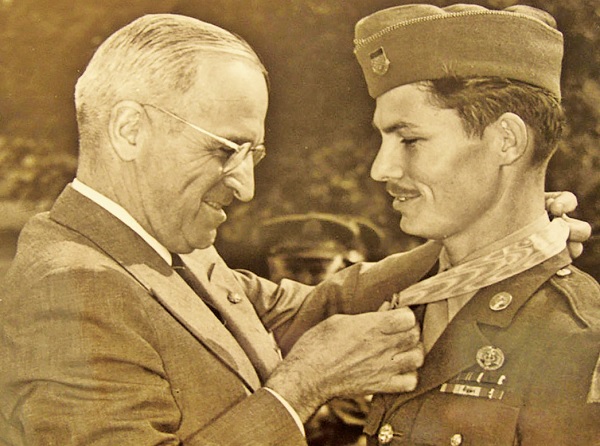
▲Desmond Doss won the medal for his efforts in rescuing injured soldiers during the war.
As a Seventh-day Adventist, Desmond Doss firmly believed that force should not be used or killing, and he also believed that he needed to join the army to serve his country. During World War II, he refused to hold a gun after joining the army. Even if he was bullied by his colleagues and superiors, he still refused to compromise. He saw his role no longer in destroying lives, but in saving them. All tools in his hands became a way to rescue injured soldiers, and the people he rescued were not only the Allies, but also the hostile Japanese.
His story of loving God and people so persistently was adapted into the 2016 movie "Hacksaw Ridge".
The sect that Desmond belongs to is not a mainstream belief. Is the dogma he believes in correct? Before questioning or judging, let us think about it, isn’t what he did to love the Lord and others with all his strength?
The teacher of the law wanted to prove himself, so he asked, "So, who is my neighbor?"...
Later, a Samaritan passed by. When he saw this man, he felt compassion for him. He quickly came forward and covered his wounds with oil and wine. Then he put him on the animal he was riding and took him to a nearby inn to take care of him. . The next day, he gave the shopkeeper two silver coins and said, "Please take good care of this person for me. If the money is not enough, I will replenish it for you when I come back."
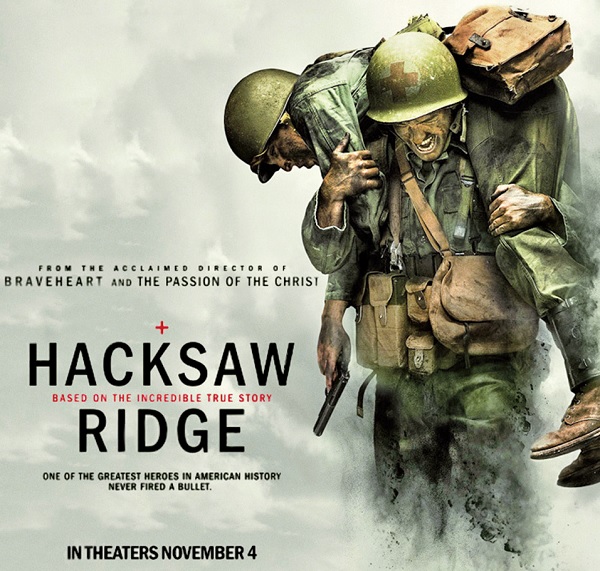
▲The story of Desmond’s persistent love for God and his lover was adapted into the 2016 movie "Hacksaw Ridge".
"Who is my neighbor?"
The lawyer was unwilling to give in. He felt that he had done well enough and looked forward to Jesus' praise. So he then asked, "Who are my neighbors?" He thought, aren't the fellow Jews who receive instruction in the synagogue, the temple officials who collect tithes, and the widows and orphans in the neighborhood who share the extra food from the festival, all neighbors?
Jesus tells a story that turns the definition of neighbor on its head.
The nameless, backgroundless protagonist walks along a road where evil ambushes him, violently attacks him, leaves him naked and dying. When the priest saw it, he took a detour; when the Levite saw it, he paid no attention to it. These two are highly respected religious elders in society, and priests should be the mediators between gods and humans. What made them decide not to help? What reason makes them ignore human life?
According to the tradition of Jewish stories, the third person who appears must be the hero. Who better to fill this role than the priests and Levites? Are they lawyers or Pharisees? These Bible scholars keep the law more seriously than anyone else!
Unexpectedly, the person who appeared on the scene was a Samaritan, who "was moved with compassion" when he saw the injured person. A series of actions describe his consistent compassion: disinfecting, bandaging, delivering to a safe place, and spending money to ensure that the injured person is taken care of.
To Jesus’ audience, this was outrageous. The Samaritans had impure blood, incomplete laws, and worshiped in the wrong place...; they were slandered and despised by ordinary Jews, so much so that this lawyer refused to even utter the word "Samaritan" from his mouth. Character. Such hostility went both ways, and the Samaritans did not think highly of the Jews. It is only mentioned in Luke Chapter 9 that Jesus’ disciples passed through a Samaritan village and were not received.
Jesus did not ignore the cultural context; He demanded to transcend it.
Christian, how would you tell this story? Who is the Samaritan to you and me? Is it someone with darker skin, or someone with less education? Pagan, or atheist? A "sinner" or someone from another political party?
Or, Jesus wants us to see the person, made in the image of God, with dignity and worth, before we see labels and categories.
This is His purpose, hitting the questioner right where he wants it.
The Good Samaritan is the neighbor of the injured person, not because they live next to each other, not because they share the same culture, and not because they are of similar class. They become neighbors because someone sees a hurt person, feels compassion, and lends a helping hand.
When we see injured people, do we feel compassion and are we willing to lend a helping hand? Before answering, can I take a step back and think about how I would like others to treat me if I were the injured person?
Because the standard for loving your neighbor is “as yourself.”
There is a scene in the movie "The Pursuit of Happyness" where the protagonist Chris (played by Will Smith) and his son sleep in a public toilet in a subway station overnight. They are unable to sleep and are kicked out by the cleaning staff.
Are there people in such trouble among us? Before lending a helping hand, do you still need to think about: Will he use the money to buy drugs? He has good hands and feet, so how can he not find a job?
Helping others can be time-consuming and labor-intensive, sometimes muddy, dirty, and even expensive, and the results may not be happy for everyone.
But binding our wounds, providing shelter, and walking beside us is what Jesus does for us. He Himself became the Good Samaritan, moved with compassion for the world hurt by sin, and reached out to help, no matter the cost. Are we willing to follow suit? What’s more, what we do to these “least of brothers” is exactly what we do to the Lord.
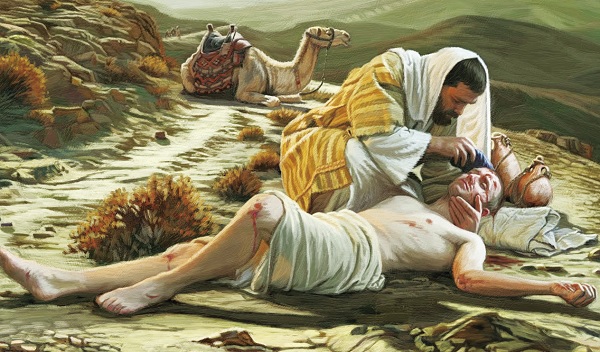
▲The Samaritan, “was moved with compassion” when he saw the injured man. A series of actions describe his consistent compassion: disinfecting, bandaging, delivering to a safe place, and spending money to ensure that the injured person is taken care of.
"You can go ahead and do the same!"
After Jesus finished telling the story, he asked the lawyer: "Who do you think is the neighbor of the man in trouble?" The lawyer gave a 100% correct answer: "The one who has mercy on him." Even though his tone was a bit bitter, at least he understood it. Jesus’ message. Jesus didn’t give him a thumbs up and said, “Excellent answer!” Jesus only said, “Go and do the same!”
The Barn Church, located in Lehigh Valley, Pennsylvania, is actively involved in community services and even named its ministry "Neighbors Matter." For them, "neighbors" can be brothers and sisters in the church, new immigrants who have just arrived, or Hondurans in Central America, Sudanese in Africa, and Romanians in Eastern Europe. Whenever there is a need, the warehouse will be your neighbor.
A brother saw a deserted amusement park and thought, if it was cleaned up, wouldn't the children from nearby schools have a place to play? He returned to the warehouse, asked the brothers and sisters to contribute money and efforts, and applied for permission from the city government to actually renovate this small garden. After it was enabled, the children climbed up and down and were very happy. The warehouse also arranges for people to take turns taking care of the children at the amusement park during school hours so that the children can play with peace of mind.
The amusement park is not near the church, so the chances of members using it are almost zero. However, Cangfang Church saw the need and did it.
New immigrants from the Middle East have also become neighbors of Cangfang Church. Brothers and sisters help them rent houses, find jobs, help them open accounts, and take driver's license exams. We don’t treat them differently because of their different religions, and we don’t actively invite them to church. We don’t want them to think that “attending church” can get help.
The stories Jesus told broke through pedantry and opened up the vision of the kingdom of heaven. He also demanded that they be put into practice. What a challenge it was for the lawyer to see the Samaritans as neighbors! Now not only does the brain have to accept it, but it also has to be done! How could the old feud between the Jews and the Samaritans be resolved with a single story?
British writer GK Chesterton once said: "The Bible tells us to love our neighbors, and it also tells us to love our enemies, probably because, in general, they are the same people."
Loving your neighbor and loving your enemy are both difficult. Since it is the command of the Lord Jesus, Christians, how can we shirk the blame? This requires a broad mind, a heavenly perspective, creativity and determination.
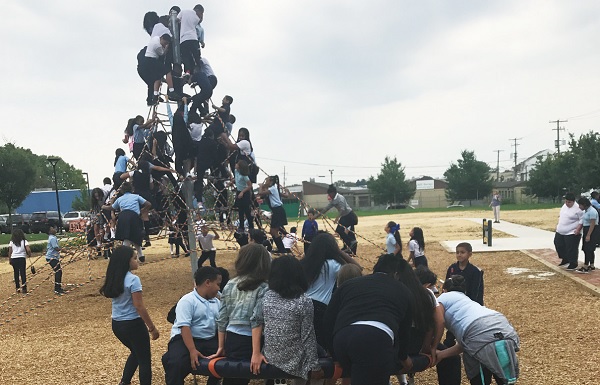
▲The Barn Church in Lehigh Valley, Pennsylvania, actively participates in community services. The picture shows a member organizing a small amusement park for friends in the community.
The union of love and justice
The hostile relationship between the Jews and the Samaritans was discrimination derived from racial and cultural differences. The chasm that has been dug for generations will not be bridged by war, nor by legislation, nor by struggle. Jesus wants us to start personally.
The racial conflict between black and white in the United States did not end with the Civil War or the abolition movement, nor did it stop with the legislation to eliminate segregation. It did not even improve eight years after the first black man entered the White House.
However, there are those who don't give up and are willing to work hard to turn enemies into friends, one person at a time.
Daryl Davis is not a politician or social activist; he is a blues musician. His method was not to shout or go to court; he talked to the "enemy" face to face. This approach stems from a question caused by being bullied as a child: "How can you hate me? You don't even know me."
What he seeks is dialogue and understanding. When both parties find that they have more similarities than differences, the distance becomes closer. Over the past thirty years, he has chatted with many members of the Ku Klux Klan (KKK, an American white supremacist who has violently harmed black people) who hate black people, and discussed each other’s views. Over the past thirty years, more than forty people have given up their white coats and no longer participate in the Klan.
That day, Dai Ruo and Ku Klux Klan leader Billy Snuffer stood on the street corner talking. People participating in the anti-white supremacist struggle shouted to Snuffer: "Get out of our city!" They were also angry with Dai Ruo: "You're a person of color, what's the point of talking to people like that!"
Dairo stood up and spoke for Snuffer: "I am a person of color and I am an American, just like this gentleman."
On the way home, Dai Ruo's phone rang. It was Snaff calling to see if he got home safely.
In the face of unfair discrimination, Dai Ruo did not choose to be bitter; he built a bridge of communication. So that a Klansman greets a descendant of slaves; a white supremacist hostile to people of color cares about the very people he is supposed to hate. 11
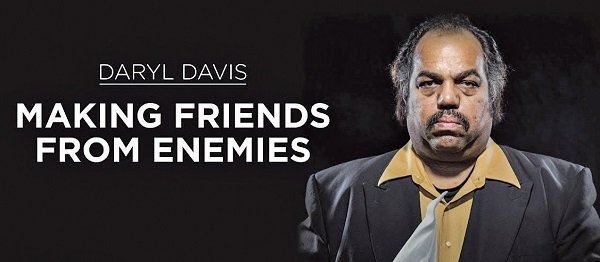
▲In the face of unfair discrimination, Dai Ruo did not choose to be bitter; he built a bridge of communication. His deeds have been made into short documentaries.
Love your neighbor as yourself. How much discrimination and conflict comes from seeing oneself as higher than others and being unable to see others as equal to oneself. My Korean friend said that people from the north of South Korea discriminate against people from the south, and my Shanghai friend said that people in the city discriminate against people from outside the city. People of the same culture and ethnicity discriminate against each other, let alone people of different ethnic groups?
Society, culture, and politics are full of discrimination, which will cause great injustice! This goes beyond individual prejudice to systemic oppression. Even in such an orderly legal system in the United States, there are always people who are marginalized and unfairly treated. Most of these people are disadvantaged: black people, immigrants, poor people, women... Who will be their neighbor?
When a person violates the law and is imprisoned, he can pay a bail and be temporarily free while awaiting trial; if he cannot pay the bail, he must stay in the detention center. Many disadvantaged groups cannot pay even one hundred or two hundred US dollars, and have no assets to mortgage, so they have to spend more time in jail. In fact, from a legal point of view, since they have not been convicted, they are still innocent.
Three members of the Circle of Hope Church located in downtown Philadelphia, Pennsylvania: Bethany Stewart, Kris Eden, and Andrew Yang, the first English unit of this magazine Edit) saw a need for this. They organized the "TurnUp to BailOut" event, inviting Philadelphians to attend a grand music dance to raise funds for those who could not afford bail. 22
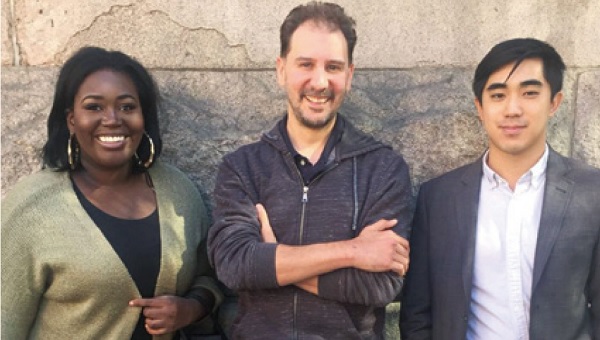
▲Spenny (left), Aikli (middle) and Yang Junan (right) who organized the "Come to Attend and Keep Out" campaign.
They have no choice in an unjust system; they open prison doors for those who are forbidden. So that the weak can enjoy freedom with others before legal judgment.
The Lord Jesus told a story to the lawyer and answered his question-who is my neighbor? He asked the lawyer-you go and do the same. Christians, we have also heard this story, have we heard this request?
Jesus is man’s neighbor, and He treats others with mercy and kindness even in unjust circumstances. Are you and I also willing to practice God’s requirements in an unjust environment: “To act justly, to love mercy, and to walk humbly with God?” (Micah 6:8)
May you and I walk with Him, going to our hurting neighbors, treating them with compassion and kindness, and loving them as ourselves.
Note 1: For the complete report, please refer to the CNN website: www.cnn.com/2017/12/15/us/charlottesville-klansman-black-man-meeting/index.html.
Note 2: For more reports, please see the Philadelphia Magazine website:www.phillymag.com/news/2017/11/14/turn-up-bail-out-incarcerated/.
 Linda Pang, wishing to describe God’s faithfulness and convey heavenly hope in words.
Linda Pang, wishing to describe God’s faithfulness and convey heavenly hope in words.
